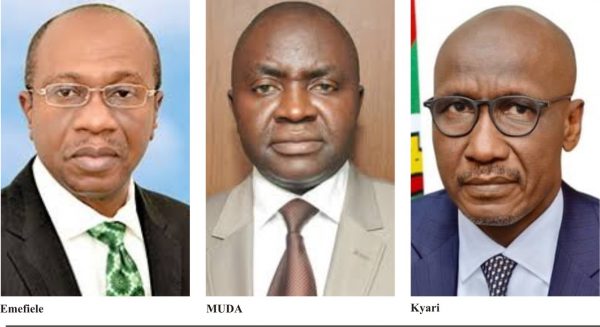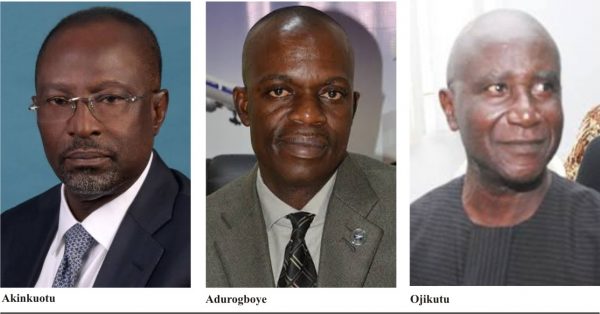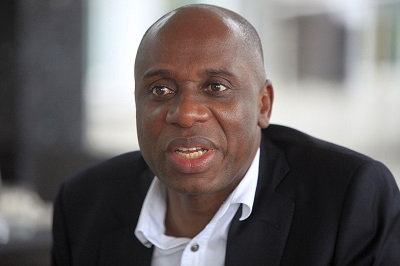Recession Looms As Covid-19, Dwindling Oil Prices, FX Issues Hit Nigeria

By Kenneth Jukpor
Following Saudi Arabia’s decision to slash its export oil prices by 10 percent at the penultimate weekend, there were devastating repercussions quickly felt, as the Brent global oil benchmark price collapsed by about $11 a barrel, or 25 percent, the sharpest decline since at least 1991, and stock market futures fell by about 3 percent.
Saudi Arabia’s action is perceived to be aimed at spiting Russia after Russia rejected an agreement with the Organization of the Petroleum Exporting Countries (OPEC) on cuts in oil supplies to bolster prices; however, this action has affected several oil producing nations as well as non-oil producing nations.
The need for OPEC to take a stand on the production and supply of crude oil was a fall-out of the coronavirus outbreak which was declared a pandemic by the World Health Organization (WHO) last week.
In Nigeria, the outbreak of coronavirus which emanated from China, has seen the nation thrown into a dilemma with the inability to export about 40 percent its crude which should have been purchased by China.
Speaking to MMS Plus on the challenge facing Nigeria’s crude oil also known as ‘black gold’, a top source at the Nigerian National Petroleum Corporation (NNPC) confirmed that the nation’s crude oil has already been hampered by the outbreak of coronavirus.
“The coronavirus has already affected the export of Nigeria’s crude. China is responsible for lifting over 40 percent of Nigeria’s crude and vessels are restricted from going to those areas. So, the vessels can’t go there because of the virus, hence, we can’t export these products.”
“The impact has been felt on revenue that should have been generated for the government. Since Nigeria’s budget is directly linked to the price of crude oil, the effect on the nation is massive and it could get worse,” he said.
He stressed that Nigeria has to look inwards to build more refineries and resuscitate the existing ones to turn the economic challenge into fortunes.
“This problem would be minimal if we could refine the crude oil in the country and the energy sector won’t be affected. It would also save us the pressure of sourcing revenue to import finished petroleum products. Energy is a very important and essential product and this development would have an impact on other sectors of the economy. That is why the foreign exchange is already affected”, he added.
Despite the crude market already flooded with supplies just as the coronavirus outbreak hits demand, Saudi Arabia, the world’s top oil exporter, plans to raise its crude oil production significantly above 10 million barrels per day (bpd) in April.
Experts say this will be a calamity for Nigeria whose economic mainstay is oil, even as the Federal Government is considering reviewing the 2020 budget as oil revenue comes under severe pressure.
The 2020 Nigeria’s budget was benchmarked on oil price assumption of $57 per barrel and oil production of 2.18mb/d. Brent is already down from $70 a barrel in early January to $31 per barrel as at last week, after Saudi Arabia slashed its export prices.
The Nigerian economy is facing another critical episode as the global oil development resulted to foreign exchange (FX) fluctuations as the country’s Bureau De Change (BDC) operators panicked and exchanged for N405 and N420 to a dollar on Thursday, last week.
Responding speedily to this development, the Central bark of Nigeria (CBN) debunked claims that it planned to devalue the naira.
CBN referred to the hike in FX as “speculative activities of unscrupulous players In the foreign exchange market, borne out of the impression that the CBN is on the verge of devaluing the Naira, and triggering panic in the FX Market”
The apex bank stated in a press release signed by its General Manager, Corporate Communications, Mr. Isaac Okorafor, that it had begun robust and coordinated investigation In collaboration with the Nigerian Financial Intelligence Unit (NFIU) and related agencies to uncover the FX dealers who are created the panic, assuring that “the full weight of our rules and regulations will be meted out to them; including, but not limited to, being charge for economic sabotage”
Despite the outbreak of the Coronavirus leading to global economic slowdown, fall in the price of crude oll, and less inflow of dollars into Nigeria and associated public health concerns leading to factory closures in China, substantial drop in imports, widespread travel restrictions around the world, and cancelation of many conferences, sporting events, business travels, and FX orders; CBN assured that the size of Nigeria’s foreign exchange reserves remains robust and comfortable.
The agency stated that it would maintain stability in all segments of the foreign exchange market to enable investors, households and other economic agents plan and conduct their genuine foreign exchange transactions with relative ease.
“Given the realities of Nigeria’s genuine and legitimate FX demand, CBN remains able and willing to meet all genuine demand for foreign exchange for legitimate transactions. For the avoidance of doubt, the CBN is also working with the fiscal authorities to accurately dimension the immediate and ‘expected impacts of the Coronavirus in order to respond comprehensively and at the same time, ensure a sound and stable financial system conducive for fob creation and Inclusive growth” the report said.
Meanwhile, the Director-General of Lagos Chamber of Commerce and Industry, Dr. Muda Yusuf told MMS Plus newspaper that global supply chain has been deeply disrupted following the outbreak of coronavirus with China, the world’s second largest economy and major supplier of inputs for manufacturing companies around the world, unable to manufacture.
“Many manufacturers and service providers in the country are already experiencing acute shortage of raw materials and intermediate inputs. This has implications for capacity utilization, employment generation and retention and adequacy of products’ supply to the domestic market”
“This has implications for the level of fiscal deficit in the budget; budget implementation will be constrained; infrastructure financing will be affected; borrowing may increase, and the capacity to fund capital project will be severely constricted. With this scenario, the outlook for oil dependent economies looks rather gloomy,” he said.
Dr. Muda noted that the current economic challenge underscores the need to review the spending structure of government and the cost of governance.
“The ballooning recurrent expenditure, in the face of declining revenue is a cause for concern. Public Private Partnership and Public Private Dialogue should be deepened to harness quality ideas on how to manage this rather scary situation” he added.
Hammered by a collapse in demand due to the coronavirus, the oil market sank deeper into chaos on the prospect of a supply free-for-all. Saudi Arabia has signaled to buyers it would ramp up output with an unambiguous declaration of intent to flood the market with crude and Russia has said its companies were free to pump as much as they could.
The cuts in monthly pricing by state producer Saudi Aramco were the first indication of how the Saudis will respond, an opening salvo in the impending price war. Offering huge discounts in Asia, Europe and the U.S., the world’s biggest exporter will be hoping to entice refiners to purchase Saudi crude at the expense of other suppliers.
What would an oil export dependent nation like Nigeria do to salvage its economy? How soon can we get our refineries working to absorb the excess crude longing for unavailable buyers?
A project like the $10 billion Bonga South West Oil field (Bonga II) planned by oil major Shell, which is expected to increase Nigeria’s total oil output by 10 percent with an additional 200,000 barrels of crude oil daily, is now questionable.
Should the nation be investing billions to produce an extra 200,000 barrels when the Saudis, Russians and others are virtually flooding the oil market? Oil prices are heading for record lows, currently at $31/barrel and may go much lower than that. What will be the break-even price to justify that investment and what is the likelihood that we can achieve that price in the near future?







